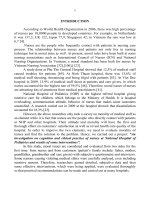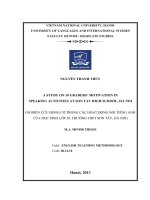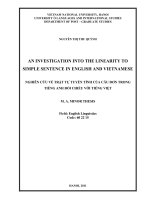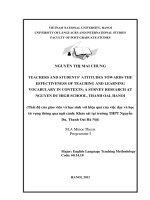An investigation on 10 graders’ anxiety at pre-stage in English writing lessons at Tien Thinh High School, Me Linh, Hanoi: Causes and Solutions
Bạn đang xem bản rút gọn của tài liệu. Xem và tải ngay bản đầy đủ của tài liệu tại đây (1.3 MB, 47 trang )
VIETNAM NATIONAL UNIVERSITY, HANOI
UNIVERSITY OF LANGUAGES AND INTERNATIONAL STUDIES
FACULTY OF POST-GRADUATE STUDIES
--------------------
TRỊNH THU HƯỜNG
An investigation on 10 graders’ anxiety at pre-stage in
English writing lessons at Tien Thinh High School, Me Linh,
Hanoi: Causes and Solutions
(Nghiên cứu về những lo lắng của học sinh lớp 10 ở giai đoạn trước khi
viết trong giờ học viết tại trường THPT Tiến Thịnh – Mê Linh – Hà Nội:
nguyên nhân và những giải pháp)
M.A. MINOR PROGRAMME THESIS
Field: English Teaching Methodology
Code: 60.14.10
Supervisor: Phạm Thị Thanh Thủy, MA
HANOI – 2011
LIST OF ABBREVIATIONS
TTHS:
Tien Thinh High School
SS:
Students
T:
Teacher
Ts:
Teachers
S:
Student
VNU-ULIS:
Vietnam National University-University of Languages and
International Studies.
TABLE OF CONTENTS
Page
DECLARATION……………………………………………………………………i
ACKNOWLEDGEMENTS……………………………………….……………….ii
ABSTRACT………………………………………………………………………..iii
LIST OF ABBREVIATIONS……………………………………………….…….iv
TABLES OF CONTENTS……………………………………………….………..v
CHAPTER ONE: INTRODUCTION
1.1. Rationale……………………………………………………………….………1
1.2. Research questions………………………………………………….…….…...1
1.3.Method of the study…………………………………………………….……...1
1.4.The participants…………………………………………………………….….2
1.5. Scope of the study………………………………………………………….….2
1.6.Overview of the thesis……………………………………………….…………2
CHAPTER TWO: LITERATURE REVIEW
2.1 Writing
2.1.1 What is writing?.................................................................................................4
2.1.2. Pre- writing/ What is pre-writing?....................................................................5
2.1.3. Pre - writing activities………………………………………….………..……5
2.1.4. Methodology in teaching writing……………………………….……..……...6
2. 1.5.Teaching writing procedures……………………………………….....………7
2.2. Anxiety
2.2.1 What is anxiety?................................................................................................ 8
2.2.2. Anxiety in learning Foreign Languages…………………………….…...……8
2.2.3 The factors causing students' anxiety in writing lessons ……….……………10
2.2.3.1 Students' factors………………………………………………..……..…….10
2.2.3.2. Teachers' factors……………………………………………………………10
2.3. Summary
CHAPTER THREE: Methodology
3.1. The context
3.1.1.Students……………………………………………………………......…….10
3.1.2.Teachers…………………………………………………………………..…10
3.1.3. Facilities…………………………………………………………….…..…..11
3.1.4 The Textbook " English 10"…………………………………………....……11
3.2. The Study
3.2.1. Addressing the problem……………………………………….……..……..12
3.2.2. Data collections……………………………………………………….....….12
3.2.3 Data analysis……………………………………………………….….....….13
3.2.3.1 Classroom observations………….……………………………………......14
3.2.3.2. Questionnaires………………………………………………………....….23
3.2.3.2.1. Data analysis of students' survey questionnaires………………...……..23
3.2.3.2.2. Data analysis of teacher����������������������������������������������������������������������������������������������������������������������������������������������������������������������������������������������������������������������������������������������������������������������������������������������������������������������������������������������������������������������������������������������������������������������������������������������������������������������������������������������������������������������������������������������������������������������������������������������������������������������������������������������������������������������������������������������������������������������������������������������������������������������������������������������������������������������������������������������������������������������������������������������������������������������������������������������������������������������������������������������������������������������������������������������������������������������������������������������������������������������������������������������������������������������������������������������������������������������������������������������������������������������������������������������������������������������������������������������������������������������������������������������������������������������������������������������������������������������������������������������������������������������������������������������������������������������������������������������������������������������������������������������������������������������������������������������������������������������������������������������������������������������������������������������������������������������������������������������������������������������������������������������������������������������������������������������������������������������������������������������������������������������������������������������������������������������������������������������������������������������������������������������������������������������������������������������������������������������������������������������������������������������������������������������������������������������������������������������������������������������������������������������������������������������������������������������������������������������������������������������������������������������������������������������������������������������������������������������������������������������������������������������������������������������������������������������������������������������������������������������������������������������������������������������������������������������������������������������������������������������������������������������������������������������������������������������������������������������������������������������������������������������������������������������������������������������������������������������������������������������������������������������������������������������������������������������������������������������������������������������������������������������������������������������������������������������������������������������������������������������������������������������������������������������������������������������������������������������������������������������������������������������������������������������������������������������������������������������������������������������������������������������������������������������������������������������������������������������������������������������������������������������������������������������������������������������������������������������������������������������������������������������������������������������������������������������������������������������������������������������������������������������������������������������������������������������������������������������������������������������������������������������������������������������������������������������������������������������������������������������������������������������������������������������������������������������������������������������������������������������������������������������������������������������������������������������������������������������������������������������������������������������������������������������������������������������������������������������������������������������������������������������������������������������������������������������������������������������������������������������������������������������������������������������������������������������������������������������������������������������������������������������������������������������������������������������������������������������������������������������������������������������������������������������������������������������������������������������������������������������������������������������������������������������������������������������������������������������������������������������������������������������������������������������������������������������������������������������������������������������������������������������������������������������������������������������������������������������������������������������������������������������������������������������������������������������������������������������������������������������������������������������������������������������������������������������������������������������������������������������������������������������������������������������������������������������������������������������������������������������������������������������������������������������������������������������������������������������������������������������������������������������������������������������������������������������������������������������������������������������������������������������������������������������������������������������������������������������������������������������������������������������������������������������������������������������������������������������������������������������������������������������������������������������������������������������������������������������������������������������������������������������������������������������������������������������������������������������������������������������������������������������������������������������������������������������������������������������������������������������������������������������������������������������������������������������������������������������������������������������������������������������������������������������������������������������������������������������������������������������������������������������������������������������������������������������������������������������������������������������������������������������������������������������������������������������������������������������������������������������������������������������������������������������������������������������������������������������������������������������������������������������������������������������������������������������������������������������������������������������������������������������������������������������������������������������������������������������������������������������������������������������������������������������������������������������������������������������������������������������������������������������������������������������������������������������������������������������������������������������������������������������������������������������������������������������������������������������������������������������������������������������������������������������������������������������������������������������������������������������������������������������������������������������������������������������������������������������������������������������������������������������������������������������������������������������������������������������������������������������������������������������������������������������������������������������������������������������������������������������������������������������������������������������������������������������������������������������������������������������������������������������������������������������������������������������������������������������������������������������������������������������������������������������������������������������������������������������������������������������������������������������������������������������������������������������������������������������������������������������������������������������������������������������������������������������������������������������������������������������������������������������������������������������������������������������������������������������������������������������������������������������������������������������������������������������������������������������������������������������������������������������������������������������������������������������������������������������������������������������������������������������������������������������������������������������������������������������������������������������������������������������������������������������������������������������������������������������������������������������������������������������������������������������������������������������������������������������������������������������������������������������������������������������������������������������������������������������������������������������������������������������������������������������������������������������������������������������������������������������������������������������������������������������������������������������������������������������������������������������������������������������������������������������������������������������������������������������������������������������������������������������������������������������������������������������������������������������������������������������������������������������������������������������������������������������������������������������������������������������������������������������������������������������������������������������������������������������������������������������������������������������������������������������������������������������������������������������������������������������������������������������������������������������������������������������������������������������������������������������������������������������������������������������������������������������������������������������������������������������������������������������������������������������������������������������������������������������������������������������������������������������������������������������������������������������������������������������������������������������������������������������������������������������������������������������������������������������������������������������������������������������������������������������������������������������������������������������������������������������������������������������������������������������������������������������������������������������������������������������������������������������������������������������������������������������������������������������������������������������������������������������������������������������������������������������������������������������������������������������������������������������������������������������������������������������������������������������������������������������������������������������������������������������������������������������������������������������������������������������������������������������������������������������������������������������������������������������������������������������������������������������������������������������������������������������������������������������������������������������������������������������������������������������������������������������������������������������������������������������������������������������������������������������������������������������������������������������������������������������������������������������������������������������������������������������������������������������������������������������������������������������������������������������������������������������������������������������������������������������������������������������������������������������������������������������������������������������������������������������������������������������������������������������������������������������������������������������������������������������������������������������������������������������������������������������������������������������������������������������������������������������������������������������������������������������������������������������������������������������������������������������������������������������������������������������������������������������������������������������������������������������������������������������������������������������������������������������������������������������������������������������������������������������������������������������������������������������������������������������������������������������������������������������������������������������������������������������������������������������������������������������������������������������������������������������������������������������������������������������������������������������������������������������������������������������������������������������������������������������������������������������������������������������������������������������������������������������������������������������������������������������������������������������������������������������������������������������������������������������������������������������������������������������������������������������������������������������������������������������������������������������������������������������������������������������������������������������������������������������������������������������������������������������������������������������������������������������������������������������������������������������������������������������������������������������������������������������������������������������������������������������������������������������������������������������������������������������������������������������������������������������������������������������������������������������������������������������������������������������������������������������������������������������������������������������������������������������������������������������������������������������������������������������������������������������������������������������������������������������������������������������������������������������������������������������������������������������������������������������������������������������������������������������������������������������������������������������������������������������������������������������������������������������������������������������������������������������������������������������������������������������������������������������������������������������������������������������������������������������������������������������������������������������������������������������������������������������������������������������������������������������������������������������������������������������������������������������������������������������������������������������������������������������������������������������������������������������������������������������������������������������������������������������������������������������������������������������������������������������������������������������������������������������������������������������������������������������������������������������������������������������������������������������������������������������������������������������������������������������������������������������������������������������������������������������������������������������������������������������������������������������������������������������������������������������������������������������������������������������������������������������������������������������������������������������������������������������������������������������������������������������������������������������������������������������������������������������������������������������������������������������������������������������������������������������������������������������������������������������������������������������������������������������������������������������������������������������������������������������������������������������������������������������������������������������������������������������������������������������������������������������������������������������������������������������������������������������������������������������������������������������������������������������������������������������������������������������������������������������������������������������������������������������������������������������������������������������������������������������������������������������������������������������������������������������������������������������������������������������������������������������������������������������������������������������������������������������������������������������������������������������������������������������������������������������������������������������������������������������������������������������������������������������������������������������������������������������������������������������������������������������������������������������������������������������������������������������������������������������������������������������������������������������������������������������������������������������������������������������������������������������������������������������������������������������������������������������������������������������������������������������������������������������������������������������������������������������������������������������������������������������������������������������������������������������������������������������������������������������������������������������������������������������������������������������������������������������������������������������������������������������������������������������������������������������������������������������������������������������������������������������������������������������������������������������������������������������������������������������������������������������������������������������������������������������������������������������������������������������������������������������������������������������������������������������������������������������������������������������������������������������������������������������������������������������������������������������������������������������������������������������������������������������������������������������������������������������������������������������������������������������������������������������������������������������������������������������������������������������������������������������������������������������������������������������������������������������������������������������������������������������������������������������������������������������������������������������������������������������������������������������������������������������������������������������������������������������������������������������������������������������������������������������������������������������������������������������������������������������������������������������������������������������������������������������������������������������������������������������������������������������������������������������������������������������������������������������������������������������������������������������������������������������������������������������������������������������������������������������������������������������������������������������������������������������������������������������������������������������������������������������������������������������������������������������������������������������������������������������������������������������������������������������������������������������������������������������������������������������������������������������������������������������������������������������������������������������������������������������������������������������������������������������������������������������������������������������������������������������������������������������������������������������������������������������������������������������������������������������������������������������������������������������������������������������������������������������������������������������������������������������������������������������������������������������������������������������������������������������������������������������������������������������������������������������������������������������������������������������������������������������������������������������������������������������������������������������������������������������������������������������������������������������������������������������������������������������������������������������������������������������������������������������������������������������������������������������������������������������������������������������������������������������������������������������������������������������������������������������������������������������������������������������������������������������������������������������������������������������������������������������������������������������������������������������������������������������������������������������������������������������������������������������������������������������������������������������������������������������������������������������������������������������������������������������������������������������������������������������������������������������������������������������������������������������������������������������������������������������������������������������������������������������������������������������������������������������������������������������������������������������������������������������������������������������������������������������������������������������������������������������������������������������������������������������������������������������������������������������������������������������������������������������������������������������������������������������������������������������������������������������������������������������������������������������������������������������������������������������������������������������������������������������������������������������������������������������������������������������������������������������������������������������������������������������������������������������������������������������������������������������������������������������������������������������������������������������������������������������������������������������������������������������������������������������������������������������������������������������������������������������������������������������������������������������������������������������������������������������������������������������������������������������������������������������������������������������������������������������������������������������������������������������������������������������������������������������������������������������������������������������������������������������������������������������������������������������������������������������������������������������������������������������������������������������������������������������������������������������������������������������������������������������������������������������������������������������������������������������������������������������������������������������������������������������������������������������������������������������������������������������������������������������������������������������������������������������������������������������������������������������������������������������������������������������������������������������������������������������������������������������������������������������������������������������������������������������������������������������������������������������������������������������������������������������������������������������������������������������������������������������������������������������������������������������������������������������������������������������������������������������������������������������������������������������������������������������������������������������������������������������������������������������������������������������������������������������������������������������������������������������������������������������������������������������������������������������������������������������������������������������������������������������������������������������������������������������������������������������������������������������������������������������������������������������������������������������������������������������������������������������������������������������������������������������������������������������������������������������������������������������������������������������������������������������������������������������������������������������������������������������������������������������������������������������������������������������������������������������������������������������������������������������������������������������������������������������������������������������������������������������������������������������������������������������������������������������������������������������������������������������������������������������������������������������������������������������������������������������������������������������������������������������������������������������������������������������������������������������������������������������������������������������������������������������������������������������������������������������������������������������������������������������������������������������������������������������������������������������������������������������������������������������������������������������������������������������������������������������������������������������������������������������������������������������������������������������������������������������������������������������������������������������������������������������������������������������������������������������������������������������������������������������������������������������������������������������������������������������������������������������������������������������������������������������������������������������������������������������������������������������������������������������������������������������������������������������������������������������������������������������������������������������������������������������������������������������������������������������������������������������������������������������������������������������������������������������������������������������������������������������������������������������������������������������������������������������������������������������������������������������������������������������������������������������������������������������������������������������������������������������������������������������������������������������������������������������������������������������������������������������������������������������������������������������������������������������������������������������������������������������������������������������������������������������������������������������������������������������������������������������������������������������������������������������������������������������������������������������������������������������������������������������������������������������������������������������������������������������������������������������������������������������������������������������������������������������������������������������������������������������������������������������������������������������������������������������������������������������������������������������������������������������������������������������������������������������������������������������������������������������������������������������������������������������������������������������������������������������������������������������������������������������������������������������������������������������������������������������������������������������������������������������������������������������������������������������������������������������������������������������������������������������������������������������������������������������������������������������������������������������������������������������������������������������������������������������������������������������������������������������������������������������������������������������������������������������������������������������������������������������������������������������������������������������������������������������������������������������������������������������������������������������������������������������������������������������������������������������������������������������������������������������������������������������������������������������������������������������������������������������������������������������������������������������������������������������������������������������������������������������������������������������������������������������������������������������������������������������������������������������������������������������������������������������������������������������������������������������������������������������������������������������������������������������������������������������������������������������������������������������������������������������������������������������������������������������������������������������������������������������������������������������������������������������������������������������������������������������������������������������������������������������������������������������������������������������������������������������������������������������������������������������������������������������������������������������������������������������������������������������������������������������������������������������������������������������������������������������������������������������������������������������������������������������������������������������������������������������������������������������������������������������������������������������������������������������������������������������������������������������������������������������������������������������������������������������������������������������������������������������������������������������������������������������������������������������������������������������������������������������������������������������������������������������������������������������������������������������������������������������������������������������������������������������������������������������������������������������������������������������������������������������������������������������������������������������������������������������������������������������������������������������������������������������������������������������������������������������������������������������������������������������������������������������������������������������������������������������������������������������������������������������������������������������������������������������������������������������������������������������������������������������������������������������������������������������������������������������������������������������������������������������������������������������������������������������������������������������������������������������������������������������������������������������������������������������������������������������������������������������������������������������������������������������������������������������������������������������������������������������������������������������������������������������������������������������������������������������������������������������������������������������������������������������������������������������������������������������������������������������������������������������������������������������������������������������������������������������������������������������������������������������������������������������������������������������������������������������������������������������������������������������������������������������������������������������������������������������������������������������������������������������������������������������������������������������������������������������������������������������������������������������������������������������������������������������������������������������������������������������������������������������������������������������������������������������������������������������������������������������������������������������������������������������������������������������������������������������������������������������������������������������������������������������������������������������������������������������������������������������������������������������������������������������������������������������������������������������������������������������������������������������������������������������������������������������������������������������������������������������������������������������������������������������������������������������������������������������������������������������������������������������������������������������������������������������������������������������������������������������������������������������������������������������������������������������������������������������������������������������������������������������������������������������������������������������������������������������������������������������������������������������������������������������������������������������������������������������������������������������������������������������������������������������������������������������������������������������������������������������������������������������������������������������������������������������������������������������������������������������������������������������������������������������������������������������������������������������������������������������������������������������������������������������������������������������������������������������������������������������������������������������������������������������������������������������������������������������������������������������������������������������������������������������������������������������������������������������������������������������������������������������������������������������������������������������������������������������������������������������������������������������������������������������������������������������������������������������������������������������������������������������������������������������������������������������������������������������������������������������������������������������������������������������������������������������������������������������������������������������������������������������������������������������������������������������������������������������������������������������������������������������������������������������������������������������������������������������������������������������������������������������������������������������������������������������������������������������������������������������������������������������������������������������������������������������������������������������������������������������������������������������������������������������������������������������������������������������������������������������������������������������������������������������������������������������������������������������������������������������������������������������������������������������������������������������������������������������������������������������������������������������������������������������������������������������������������������������������������������������������������������������������������������������������������������������������������������������������������������������������������������������������������������������������������������������������������������������������������������������������������������������������������������������������������������������������������������������������������������������������������������������������������������������������������������������������������������������������������������������������������������������������������������������������������������������������������������������������������������������������������������������������������������������������������������������������������������������������������������������������������������������������������������������������������������������������������������������������������������������������������������������������������������������������������������������������������������������������������������������������������������������������������������������������������������������������������������������������������������������������������������������������������������������������������������������������������������������������������������������������������������������������������������������������������������������������������������������������������������������������������������������������������������������������������������������������������������������������������������������������������������������������������������������������������������������������������������������������������������������������������������������������������������������������������������������������������������������������������������������������������������������������������������������������������������������������������������������������������������������������������������������������������������������������������������������������������������������������������������������������������������������������������������������������������������������������������������������������������������������������������������������������������������������������������������������������������������������������������������������������������������������������������������������������������������������������������������������������������������������������������������������������������������������������������������������������������������������������������������������������������������������������������������������������������������������������������������������������������������������������������������������������������������������������������������������������������������������������������������������������������������������������������������������������������������������������������������������������������������������������������������������������������������������������������������������������������������������������������������������������������������������������������������������������������������������������������������������������������������������������������������������������������������������������������������������������������������������������������������������������������������������������������������������������������������������������������������������������������������������������������������������������������������������������������������������������������������������������������������������������������������������������������������������������������������������������������������������������������������������������������������������������������������������������������������������������������������������������������������������������������������������������������������������������������������������������������������������������������������������������������������������������������������������������������������������������������������������������������������������������������������������������������������������������������������������������������������������������������������������������������������������������������������������������������������������������������������������������������������������������������������������������������������������������������������������������������������������������������������������������������������������������������������������������������������������������������������������������������������������������������������������������������������������������������������������������������������������������������������������������������������������������������������������������������������������������������������������������������������������������������������������������������������������������������������������������������������������������������������������������������������������������������������������������������������������������������������������������������������������������������������������������������������������������������������������������������������������������������������������������������������������������������������������������������������������������������������������������������������������������������������������������������������������������������������������������������������������������������������������������������������������������������������������������������������������������������������������������������������������������������������������������������������������������������������������������������������������������������������������������������������������������������������������������������������������������������������������������������������������������������������������������������������������������������������������������������������������������������������������������������������������������������������������������������������������������������������������������������������������������������������������������������������������������������������������������������������������������������������������������������������������������������������������������������������������������������������������������������������������������������������������������������������������������������������������������������������������������������������������������������������������������������������������������������������������������������������������������������������������������������������������������������������������������������������������������������������������������������������������������������������������������������������������������������������������������������������������������������������������������������������������������������������������������������������������������������������������������������������������������������������������������������������������������������������������������������������������������������������������������������������������������������������������������������������������������������������������������������������������������������������������������������������������������������������������������������������������������������������������������������������������������������������������������������������������������������������������������������������������������������������������������������������������������������������������������������������������������������������������������������������������������������������������������������������������������������������������������������������������������������������������������������������������������������������������������������������������������������������������������������������������������������������������������������������������������������������������������������������������������������������������������������������������������������������������������������������������������������������������������������������������������������������������������������������������������������������������������������������������������������������������������������������������������������������������������������������������������������������������������������������������������������������������������������������������������������������������������������������������������������������������������������������������������������������������������������������������������������������������������������������������������������������������������������������������������������������������������������������������������������������������������������������������������������������������������������������������������������������������������������������������������������������������������������������������������������������������������������������������������������������������������������������������������������������������������������������������������������������������������������������������������������������������������������������������������������������������������������������������������������������������������������������������������������������������������������������������������������������������������������������������������������������������������������������������������������������������������������������������������������������������������������������������������������������������������������������������������������������������������������������������������������������������������������������������������������������������������������������������������������������������������������������������������������������������������������������������������������������������������������������������������������������������������������������������������������������������������������������������������������������������������������������������������������������������������������������������������������������������������������������������������������������������������������������������������������������������������������������������������������������������������������������������������������������������������������������������������������������������������������������������������������������������������������������������������������������������������������������������������������������������������������������������������������������������������������������������������������������������������������������������������������������������������������������������������������������������������������������������������������������������������������������������������������������������������������������������������������������������������������������������������������������������������������������������������������������������������������������������������������������������������������������������������������������������������������������������������������������������������������������������������������������������������������������������������������������������������������������������������������������������������������������������������������������������������������������������������������������������������������������������������������������������������������������������������������������������������������������������������������������������������������������������������������������������������������������������������������������������������������������������������������������������������������������������������������������������������������������������������������������������������������������������������������������������������������������������������������������������������������������������������������������������������������������������������������������������������������������������������������������������������������������������������������������������������������������������������������������������������������������������������������������������������������������������������������������������������������������������������������������������������������������������������������������������������������������������������������������������������������������������������������������������������������������������������������������������������������������������������������������������������������������������������������������������������������������������������������������������������������������������������������������������������������������������������������������������������������������������������������������������������������������������������������������������������������������������������������������������������������������������������������������������������������������������������������������������������������������������������������������������������������������������������������������������������������������������������������������������������������������������������������������������������������������������������������������������������������������������������������������������������������������������������������������������������������������������������������������������������������������������������������������������������������������������������������������������������������������������������������������������������������������������������������������������������������������������������������������������������������������������������������������������������������������������������������������������������������������������������������������������������������������������������������������������������������������������������������������������������������������������������������������������������������������������������������������������������������������������������������������������������������������������������������������������������������������������������������������������������������������������������������������������������������������������������������������������������������������������������������������������������������������������������������������������������������������������������������������������������������������������������������������������������������������������������������������������������������������������������������������������������������������������������������������������������������������������������������������������������������������������������������������������������������������������������������������������������������������������������������������������������������������������������������������������������������������������������������������������������������������������������������������������������������������������������������������������������������������������������������������������������������������������������������������������������������������������������������������������������������������������������������������������������������������������������������������������������������������������������������������������������������������������������������������������������������������������������������������������������������������������������������������������������������������������������������������������������������������������������������������������������������������������������������������������������������������������������������������������������������������������������������������������������������������������������������������������������������������������������������������������������������������������������������������������������������������������������������������������������������������������������������������������������������������������������������������������������������������������������������������������������������������������������������������������������������������������������������������������������������������������������������������������������������������������������������������������������������������������������������������������������������������������������������������������������������������������������������������������������������������������������������������������������������������������������������������������������������������������������������������������������������������������������������������������������������������������������������������������������������������������������������������������������������������������������������������������������������������������������������������������������������������������������������������������������������������������������������������������������������������������������������������������������������������������������������������������������������������������������������������������������������������������������������������������������������������������������������������������������������������������������������������������������������������������������������������������������������������������������������������������������������������������������������������he author gives an introduction on the study. This part presents the
rationale, the research questions, the method of the study, the participants, and the scope
of the study and the overview of the thesis. The second part is the most important one
which presents the review of literature with theoretical backgrounds of learning and
teaching writing, pre-writing factors to reduce students’ anxiety in writing lessons. The
next is the study with the data analysis and findings of questionnaires and classroom
observations. The last chapter gives some suggested solutions to improve the quality of
learning and teaching writing for 10 graders. The author conducts this research with the
hope that this study would be of some values to both teachers and students in their
language teaching and learning process.
Being one of the teachers at TTHS, I can clearly see the present situation of teaching and
learning writing skill which is one of TTHS students’ and teachers’ challenges. This
study is done in the hope of finding out the factors causing students’ anxiety and
contributing some recommended strategies for teachers and students to reduce this kind
of anxiety.
Based on the survey questionnaires and classroom observations, the author can arrive at
the following conclusions:
+ Learners are anxious in the writing lessons, and the causes of their anxiety are that (1)
students are not provided with enough vocabularies and structures relating to their writing
lesson in pre-stage, (2) teachers’ instructions and teachers’ mood and enthusiasm are not
good and sufficient enough, (3) the teachers are not aware of the importance of prewriting stage, (4) teachers’ preparation for pre-writing activities before class is not good
enough and (5) teachers do not care well enough about how students feel in pre-writing
stage.
+ Some strategies that could be employed for teachers and students to reduce anxiety and
improve teaching and learning writing skill include the following:
On the part of teachers, they can help their students to reduce anxiety by giving clear and
understandable instructions, providing students with new words and structures in
effective ways, creating free-anxiety classroom.
On the part of students, they can reduce their own anxiety by having more writing
practice,
participating in pair work and group work, improving English proficiency.
5.2. Limitations and suggestions for further study
The study still has some limitations. First of all, the scale of this study is very small,
which focuses on only the effects of pre-writing stage to reduce students’ anxiety so
while-writing stage and post- writing stage are not mentioned here. Secondly, this study
basically bases on the source of questionnaires so the author cannot guarantee the
reliability of the information collected. Moreover, this study is only restricted to
classroom writing lessons in the textbook English 10 so any application outside the
classroom context requires more careful consideration. Finally, there are still some
problems that this study could not solve completely: students’ English level is so bad that
needs time to get improvement. In order to get the improvement, it is necessary for the
teachers to pay more attention to their teaching methods and preparations. The author
hopes that the above problems will be solved in other studies in the future.
References
Tiếng Việt:
1. Bộ giáo dục và đào tạo ( 2006). Tiếng Anh 10, Nxb Giáo dục, Hà Nội.
2. Đỗ Tuấn Minh. ( 2007), Tài liệu bồi dưỡng giáo viên THPT “Đổi mới phương
pháp dạy học theo chương trình và sách giáo khoa lớp 10 mới” Đại học Ngoại Ng
ữ, Đại học Quốc gia Hà Nội, Hà Nội.
Tiếng Anh:
1. Breach, D (2005). Exploring the Vietnamese Concept of a “Good Teacher”.
Teacher’s Edition 16, (30-37).
2. Brown, H.D (1994). Teaching by Principles. Englewood Cliffs, NJ; Prentice Hall.
3. Byrne, D (1988), Teaching Writing Skill, Longman, London
4.Coffin, C., Curry, M., Goodman, S., Hewings, A., Lillis, T., & Swann, J.
(2003), Teaching academic writing: A toolkit for higher education, London: Routledge.
5. Darwin, C.R (1827). The expression of emotion in man and animal. London: John
Murray
6. Harmer, J (2001). The Practice of English Language Teaching ( 3rd Edition).
Excess: Longman.
7. Horwitz, E.K., Horwitz, MB, & Cope, J (1986). Foreign language classroom
anxiety. Modern Language Journal, 70, 125-132.
8. Lannon, J.M (1989), The writing process: A concise Rhetic, Southeastern
Massachusetts University.
9. MacIntyre, P.D, & R.C Gardner (1994a), The subtle effects of language anxiety on
cognitive processing in the second language. Language Learning, 44(2), 238-305.
10. MacIntyre, P.D ( 1999), Language anxiety: A review for the reseach for language
teachers. In D.J. Young (Ed), Affect in foreign language and second language learning:
A practical guide to creating a low-anxiety classroom asmosphere ( pp.24-45). NY: Mc
Graw- Hill.
11. May, R.(1977), The meaning of anxiety. New York: Washington Square Press.
12. McCroskey, J.C(1978), Vadility of the PRCA as an index of oral communication
apprehension. Communication Monographs, 45,192-203.
13. Nguyen, B. & Nguyen, B. N. (2001). A course in TEFL: Theory and Practice III.
Hanoi: College of Foreign Languages, VNU, Hà Nội.
14. Raimes, A (1983), Techniques in Teaching Writing, OUP.
15. Richmond, E.M. ( 1985), Composition and Grammar 11, Laidlaw Brothers
16. Rivers, W.M (1981), Teaching Foreign Language Skills ( 2nd ed), The University
od Chicago Press, Chicago
17. Sarason, I.G. (1986), Test anxiety, worry, and cognitive interference. In R.
Schwarzer (Ed.). Self-related Cognition In Anxiety And Motivation. Hillsdale, NJ:
Erlbaum. 19-34.
18. Sokolik, M. (2003). Writing. In D. Nunan (Ed.), Practical English language
teaching (pp. 87-108). China: McGraw-Hill Companies, Inc and Higher Education Press.
19. Spielberger, C.D (1983), Manual for the State-Trait Anxiety Inventory (Form Y).
Palo Alto, California: Consulting Psychologists.
20. Steele, V. (2002). Product and process writing: A comparison. Retrieved from the
World Wide Web 27 July 2006 at /write/
approaches.shtml
21. Tobias, S. (1986), Anxiety and cognitive processing of instructions. In R.
Schwarzer (Ed), Self- related cognition in anxiety and motivation. (pp.35-54), Hillside,
NJ: Erlbaum.
22. Tribble, C (1996), Writing, Oxford University Press, Oxford.
23. Ur, P. (1996), A Course of Language Teaching: Practice & Theory, Cambridge
University Press.
Appendices
Appendix 1: Survey Questionnaires for the teachers
This survey questionnaire is designed for my Thesis “Using pre-writing activities
to reduce 10 graders’ anxiety in English writing lessons at Tien Thinh High School,
Me Linh, Hanoi.” Your assistance in completing the survey questionnaires is highly
appreciated. All the information provided by you is reserved for the study purpose, and
you can be confident that you will not be identified in any discussion of the data.
Thanks you very much for your cooperation!
Please circle your answer
1. Do you like teaching writing skill?
C.
D.
2.
E.
F.
G.
H.
3.
E.
F.
G.
H.
4.
Yes
No
In your opinion, which of these writing stages is the most important?
warm-up
pre- writing
while-writing
post- writing
Do you prepare well for the pre-writing activities?
Always
Sometimes
Rarely
Never
Do you think that your students feel anxious in your writing lessons?( if yes
please answer the next question)
F. yes, most of my students
G. Yes, all of them feel anxious
H. No, they are not completely anxious
I. Maybe, I am not sure
5. In your opinion, what is the main cause of the students’ anxiety?
D. The topic is difficult or uninteresting
E. Your instructions in pre- writing stage is not clear enough
F. Students’ language competence is limited
G. Others (………………………………………………………………...)
6. What is your suggestion toward reducing students’ anxiety in the writing lessons?
(Please write down your suggestions).
…………………………………………………………………………………………..
Many Thanks!
Appendix 2. A: Questionnaires for the students
Các câu hỏi dưới đây được thiết kế để có được sự đánh giá của các em về việc các
hoạt động trước khi viết ảnh hưởng như thế nào đến việc học viết của các em. Việc có
được sự đánh giá của các em sẽ giúp chúng tôi điều chỉnh hoạt động dạy viết cho phù
hợp với các em hơn nhằm nâng cao chất lượng hoc viết tại trường.
Rất mong nhận được sự hợp tác của các em. Mọi thông tin các em cung cấp đều
được bảo mật. Xin chân thành cảm ơn các em!
Em hãy khoanh tròn vào câu trả lời tương ứng sau đây.
1.
A.
B.
C.
D.
2.
A.
B.
C.
D.
3.
Giờ viết của các em hôm nay như thế nào?
Rất thú vị
Thú vị
Không thú vị lắm
Rất chán
Em cảm thấy như thế nào trong giờ viết hôm nay?
Lo lắng vì không viết được gì
Không hài lòng lắm vì bài viết chưa tốt
Vui vẻ vì được tham gia vào các hoạt động trước khi viết
Hài lòng vì viết rất tốt
Theo quan điểm của em, giai đoạn nào của quá trình viết có thể gây ảnh hưởng
nhất đến kết quả bài viết của em?
A. Giai đoạn khởi động
B. Giai đoạn trước khi viết
C. Giai đoạn trong khi viết
D. Giai đoạn sau khi viết.
4. Em có thích các hoạt động trước khi viết được cô giáo sử dụng ngày hôm nay
không?
A. Có
B. Không
5. Em hãy chọn một lí do chính trong những lí do dưới đây khiến em cảm thấy lo
lắng trong giờ viết
A. Chủ đề bài viết khó
B. Em không được chuẩn bị kĩ về từ vựng và cấu trúc trước khi viết
C. Cô giáo chủ yếu giải thích bằng tiếng anh nên em không hiểu yêu cầu của bài viết
D. Em không có ý tưởng để viết.
E. Những lí do khác: Sự nhiệt tình, tâm trạng của cô giáo….
Thank you!
Appendix 2.B: Questionnaires for the students
Question 1: How is your writing lesson today?
A. Very interesting
B. Interesting
C. Not interesting
D. Boring
Question 2: How did you feel in the writing lesson today?
A. Anxious because I wrote nothing
B. Not satisfied because the writing was not good
C. Satisfied because the writing was very good
D. Eager with the pre- writing activities
Question 3: In your opinion, which writing stage most affect your writing result?
A.
Warm-up
B.
Pre-writing
C.
While-writing
D. Post- writing
Question 4: Do you like those pre-writing activities used by your teachers today?
C. Yes
D. No
Question 5: Which is the main cause of your anxiety in the writing lesson?
F. The writing topic is difficult
G. I am not provided enough vocabularies and structures relating to the
writing lesson in the pre-writing stage.
H. The teacher only explained in English so I can not understand well
I. I have no ideas to write.
J. Others: Teacher’s mood, enthusiasm….
Thank you!
Appendix 3 – Tasks in writing lessons (Source: Tieng Anh 10 Textbook)
Lesson 1: Filling in a form. (Unit 1: Writing, p27, 28)
Task 1: Work in pairs. Answer the following questions
1. On what occasions do you have to fill in a form?
2. What sort of information do you often have to provide when you fill in a
form?
Task 2: Forms do not usually ask questions, but they ask for information. Match a line in
A with a question in B.
A
B
1. First name
a. What do you do?
2. Surname
b. Where are you living at the
3. Date of birth
moment?
4. Place of birth
c. Are you married or single?
5. Present address
d. What’s your first name?
6. Marital status
e. When was you born?
7. Occupation
f. What’s your surname?
g. Where were you born?
Task 3: Forms asks you to do certain things. Do the following:
1. Write your name in block capitals
…………………………………………………………………………………
…
2. Sign your name: …………………………………………
3. Delete where not applicable.
I am a student/ an employee/ an employer.
4. Put a cross if you are male.
5. Put a tick if you are female.
Task 4: Fill in the following form.
THE OAK TREE SCHOOL OF ENGLISH ENROLMENT FORM
PLEASE WRITE IN CAPITAL LETTERS
Mr./Mrs./Miss*
Surname……………………………………………………………………
First name………………………………………………………………
Date of birth……………………………………………………………
Nationality………………………………………………………………
Language(s)……………………………………………………………
Address in your country…………………………………………………
Occupation………………………………………………………………
Reasons for learning English: Business/Pleasure/Exams/Other
( If others, please specify)………………………………………………
How many hours a day do you want to stay at the school?
…………………………………………………………………………
What date do you want to start?......................
Delete where not applicable
Lesson 2: Writing a confirmation letter (Unit 6: Writing, p.69)
Task 1: Work in pairs. Read the two letters below and find the requests in Nga’s letter
and the confirmation in Hoa’s
Dear Hoa,
My class is going to have a picnic at Ao Vua this weekend. This is the
first time I go for a pinic.
Can you go shopping with me to buy the things we need for the trip? I
will pick you up at 2: 30 p.m tomorrow. Is the time convenient for you?
Please let me know as soon as possible.
Yours,
Nga
Dear Nga,
I’m glad to hear that you are going to have your first picnic with your
classmates.
Certainly, I will help you to prepare everything you need for the trip.
Fortunately, I am having a day off tomorrow. So, I am free in the
afternoon.
I’ll be waiting for you at 2:30 p.m tomorrow.
Love,
Hoa
Task 2: Read the situations and write a confirmation letter responding to each of them.
1. Lan is going to have a birthday party at 8:00 p.m on Saturday. She asks you to buy her
two bunches of bananas, three kilos of oranges, ten mangoes, and bring them to her house
an hour before the party. You agree to help her.
2. Minh wants to borrow a book about wife life. He is coming for the book at 9:00 a.m.
this Saturday. You accept his request but suggest a later time.









